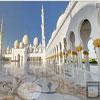
- It is Sunday morning in a dusty and desolate industrial suburb of Athens.
Women and children from a local Pakistani community are gathering outside a former factory that has become a makeshift mosque.
Inside, sandals are flung into wooden racks as the children rush to take their places on the plush red carpets on the concrete floor. They are ready for a morning of English, Urdu and religious classes.
This underground mosque in the suburb of Peristeri is one of 100 proving a place of worship for the 300,000 Muslims in the Greek capital.
For Pakistani teacher Tayyaba Ishtiaq, an old factory is less than ideal.
"We have to rent this place far away from the public," she said, according to abc.net.au.
"It's in an industrial area that is not secure. We feel far from society here."
Official mosque delayed by residents' objections
Athens is believed to be the only European capital without an official mosque. The government promised funds to build one in 2000, but the objections of more than 100 residents have delayed those plans.
Supporters hope construction will start in the Athens neighborhood of Votanikos in September, despite elements of the Greek Orthodox Church fighting to stop it.
Greece is dotted with former mosques from the Ottoman Empire. Since Greece won independence in 1832, they have fallen into disrepair and ruin.
Orthodox Christianity is Greece's prevailing religion and there is no formal separation between church and state. The government funds church construction and pays the salaries and pensions of its priests.
Greece's disparate Muslim communities of more than a million have recently been swollen by asylum seekers. All struggle to find places to worship, squeezing into private homes or renting from the few property owners tolerant of underground mosques.
"If the Greek constitution says everyone has religious rights, where are my rights?" Javed Aslam, president of the main Pakistani community organization, asks.
source : abna24













